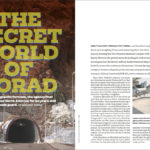 SomaLogic is not the only company exploring proteomics to fix our broken healthcare system. There are a dozen firms whose endeavors I wasn’t able to include in my feature for The New York Times Sunday magazine. It seems biotech has turned its focus on proteomics—and not a moment too soon. We all know that person who was diagnosed unexpectedly with a serious, even terminal illness, despite appearing perfectly healthy. The tragic stories are commonplace and largely unpreventable when doctors rely on symptoms to diagnose disease. Our approach to health is inherently passive—we wait around to get sick before going to the doctor. I’ve always found this baffling, akin to driving my SUV until its tires are bald, and then continuing onward until the rubber tread disintegrates entirely. Evolution honed our bodies to endure despite impairment—we might feel terrific even when we’re gravely ill. Proteomics aims to make medicine proactive versus reactive, a smarter strategy since many diseases are curable if caught soon enough.
SomaLogic is not the only company exploring proteomics to fix our broken healthcare system. There are a dozen firms whose endeavors I wasn’t able to include in my feature for The New York Times Sunday magazine. It seems biotech has turned its focus on proteomics—and not a moment too soon. We all know that person who was diagnosed unexpectedly with a serious, even terminal illness, despite appearing perfectly healthy. The tragic stories are commonplace and largely unpreventable when doctors rely on symptoms to diagnose disease. Our approach to health is inherently passive—we wait around to get sick before going to the doctor. I’ve always found this baffling, akin to driving my SUV until its tires are bald, and then continuing onward until the rubber tread disintegrates entirely. Evolution honed our bodies to endure despite impairment—we might feel terrific even when we’re gravely ill. Proteomics aims to make medicine proactive versus reactive, a smarter strategy since many diseases are curable if caught soon enough.
2018 archives
Standard
December 8, 2018 by Michael BeharWar Games | December 8, 2018
 Remember when Matthew Broderick hacked into a DOD supercomputer and inadvertently started a simulation that threatened to launch a global nuclear war? I visited the North American Aerospace Defense Command (NORAD), where the film purportedly took place, and discovered that Hollywood did a darn good job of mocking up the most secure and impenetrable military bunker in the world. I live in Boulder, about a two-hour drive from NORAD, which sits deep inside Cheyenne Mountain, a natural granite fortress near Colorado Springs. Air & Space magazine sent me into the facility to write a feature pegged to NORAD’s 60th anniversary. I’m thinking, “60 years?” The place will be dusty and antiquated, with clunky knobs and dials, like the inside of an Apollo Command Module. I was wrong. Every aspect of NORAD has been modernized and upgraded. Its state-of-the-art imaging satellites can track just about every moving object anywhere on the planet—planes, trains, automobiles, watercraft, even my kids riding their scooters down our block. The last thing I expected was to leave NORAD feeling safer. While any lingering expectations of personal privacy quickly evaporated by the end of my tour—these folks can read the label on my jeans from orbit—at least I’ll get a 15-minute heads-up before the ICBMs detonate.
Remember when Matthew Broderick hacked into a DOD supercomputer and inadvertently started a simulation that threatened to launch a global nuclear war? I visited the North American Aerospace Defense Command (NORAD), where the film purportedly took place, and discovered that Hollywood did a darn good job of mocking up the most secure and impenetrable military bunker in the world. I live in Boulder, about a two-hour drive from NORAD, which sits deep inside Cheyenne Mountain, a natural granite fortress near Colorado Springs. Air & Space magazine sent me into the facility to write a feature pegged to NORAD’s 60th anniversary. I’m thinking, “60 years?” The place will be dusty and antiquated, with clunky knobs and dials, like the inside of an Apollo Command Module. I was wrong. Every aspect of NORAD has been modernized and upgraded. Its state-of-the-art imaging satellites can track just about every moving object anywhere on the planet—planes, trains, automobiles, watercraft, even my kids riding their scooters down our block. The last thing I expected was to leave NORAD feeling safer. While any lingering expectations of personal privacy quickly evaporated by the end of my tour—these folks can read the label on my jeans from orbit—at least I’ll get a 15-minute heads-up before the ICBMs detonate.
Standard
December 8, 2018 by Michael BeharMountain Time and Its Power to Awe | December 8, 2018
 “Time does not fly when you’re having fun,” is what I insisted to anyone who claimed otherwise. Whenever I broke from the mundane, time slowed down, or at least my perception of it. It irked me that nobody else seemed to notice this phenomenon. So I proposed a story about it to 5280 magazine. As it turns out, neuroscientists had been investigating the so-called “vacation paradox” for decades. Hooray! I wasn’t delusional. Time actually does pass more slowly when we’re doing out of the ordinary stuff. For me, it occurs while engaged in outdoor pursuits—skiing, backpacking, mountain biking, trail running. While researching the article for 5280, I learned that a key trigger for altering time perception (that is, slowing it down) is the sensation of “awe”—when we witness something amazing. That discovery led to a second article, for Men’s Health, published in June 2018, about the health benefits we get during awe-inspiring experiences. Apparently having our minds blown is good for us.
“Time does not fly when you’re having fun,” is what I insisted to anyone who claimed otherwise. Whenever I broke from the mundane, time slowed down, or at least my perception of it. It irked me that nobody else seemed to notice this phenomenon. So I proposed a story about it to 5280 magazine. As it turns out, neuroscientists had been investigating the so-called “vacation paradox” for decades. Hooray! I wasn’t delusional. Time actually does pass more slowly when we’re doing out of the ordinary stuff. For me, it occurs while engaged in outdoor pursuits—skiing, backpacking, mountain biking, trail running. While researching the article for 5280, I learned that a key trigger for altering time perception (that is, slowing it down) is the sensation of “awe”—when we witness something amazing. That discovery led to a second article, for Men’s Health, published in June 2018, about the health benefits we get during awe-inspiring experiences. Apparently having our minds blown is good for us.
Standard
December 8, 2018 by Michael BeharParamotoring and Paragliding Shenanigans | December 8, 2018
 I wrote two features last year about variations on the sport of paragliding. In September 2017, for Air & Space magazine, I chronicled a maniacal cross-country paramotoring race over the American Southwest. Paramotoring pilots take to the air with lawn mower-like motors strapped to their backs and huge propellers spinning inches from their heads. Paramotoring engines are loud but useful: they keep pilots aloft when they’re flying over sketchy ground with nowhere to land. Paragliders are braver (or more foolish) because they rely solely on their keen piloting skills to stay airborne. In 5280’s December 2017 issue, I followed a paraglider who attempted to traverse Colorado’s Rocky Mountains. It didn’t work out so well. But he didn’t die, which in paragliding circles is a bonus. Having covered aerospace and aviation for nearly 20 years, I’ve determined that gravity works. I’ve also learned that our atmosphere is inherently chaotic and unpredictable, making it unwise to take flight harnessed beneath an oversized handkerchief. Aviators like to say, “There are old pilots and bold pilots. But there are no old, bold pilots.” Paramotorers and paragliders ought to heed a similar but appended adage: “There are no old pilots.”
I wrote two features last year about variations on the sport of paragliding. In September 2017, for Air & Space magazine, I chronicled a maniacal cross-country paramotoring race over the American Southwest. Paramotoring pilots take to the air with lawn mower-like motors strapped to their backs and huge propellers spinning inches from their heads. Paramotoring engines are loud but useful: they keep pilots aloft when they’re flying over sketchy ground with nowhere to land. Paragliders are braver (or more foolish) because they rely solely on their keen piloting skills to stay airborne. In 5280’s December 2017 issue, I followed a paraglider who attempted to traverse Colorado’s Rocky Mountains. It didn’t work out so well. But he didn’t die, which in paragliding circles is a bonus. Having covered aerospace and aviation for nearly 20 years, I’ve determined that gravity works. I’ve also learned that our atmosphere is inherently chaotic and unpredictable, making it unwise to take flight harnessed beneath an oversized handkerchief. Aviators like to say, “There are old pilots and bold pilots. But there are no old, bold pilots.” Paramotorers and paragliders ought to heed a similar but appended adage: “There are no old pilots.”
Standard
December 8, 2018 by Michael BeharColorado’s Infamous Mountain Corridor | December 7, 2018
 The interstate that feeds Colorado’s mountain recreation areas is dysfunctional, at least occasionally. Traffic flows smoothly most of the time. But every summer and winter weekend, gridlock invariably snarls I-70. You might wonder what has improved since I wrote about I-70 for 5280magazine in March 2017? Answer: nothing. In fact, the situation is worse when you consider that in the past year about 100,000 more people have moved intoColorado. State legislators attempted and failed to pass sweeping transportation taxes to fix the roads; voters rejected similar ballot measures. Nobody who drives in Colorado wants to pay for actually driving. The situation frustrated CDOT executive director Shailen Bhatt, who stepped down in October 2017 for a job in the private sector. Meanwhile, a bid to host the 2030 Winter Olympic Games in Colorado is making the rounds, a preposterous proposition unless the state magically finds the estimated $20billion needed to upgrade the roadway. Could Winter Games catalyze taxpayer support for an I-70 overhaul? I’m not betting on it.
The interstate that feeds Colorado’s mountain recreation areas is dysfunctional, at least occasionally. Traffic flows smoothly most of the time. But every summer and winter weekend, gridlock invariably snarls I-70. You might wonder what has improved since I wrote about I-70 for 5280magazine in March 2017? Answer: nothing. In fact, the situation is worse when you consider that in the past year about 100,000 more people have moved intoColorado. State legislators attempted and failed to pass sweeping transportation taxes to fix the roads; voters rejected similar ballot measures. Nobody who drives in Colorado wants to pay for actually driving. The situation frustrated CDOT executive director Shailen Bhatt, who stepped down in October 2017 for a job in the private sector. Meanwhile, a bid to host the 2030 Winter Olympic Games in Colorado is making the rounds, a preposterous proposition unless the state magically finds the estimated $20billion needed to upgrade the roadway. Could Winter Games catalyze taxpayer support for an I-70 overhaul? I’m not betting on it.
Standard
November 22, 2018 by Michael BeharTHE NEW YORK TIMES | NOVEMBER 18, 2018
 The Everything Test Download PDF
The Everything Test Download PDF
Most diseases give off a molecular signal before they show symptoms. Can the science of proteomics learn to spot them?
The sergeant with the Mount Crested Butte Police Department in Colorado appeared shortly after 9 P.M. It was August 1, 2017, and I was with my wife and our two young children, ages 2 and 7, at Lake Irwin, a remote campsite at 10,200 feet in the Rocky Mountains. When the officer stepped out of his S.U.V. cruiser, its blue and red emergency strobes piercing the darkness, I thought that perhaps a neighboring camper had summoned him to silence my dissonant guitar strumming beside the campfire. Continue reading →
Standard
September 5, 2018 by Michael BeharAir & Space | September 2018
 The Secret World of NORAD Download PDF
The Secret World of NORAD Download PDF
Inside its granite fortress, the agency that has protected North America for 60 years still stands guard.
About halfway through the tunnel, our bus driver stops beside two steel blast doors, each weighing 25 tons and measuring three feet thick. I’m traveling this frigid January morning into the Cheyenne Mountain Complex with Steve Rose, the facility’s deputy director, who greeted me in the parking lot with an earnest handshake. Rose is escorting me into the historic military bunker burrowed deep into the Rocky Mountain foothills, seven miles southwest of downtown Colorado Springs. “The mountain,” as the complex is known colloquially, is the alternate command center for the North American Aerospace Defense Command (NORAD), which celebrates its 60th anniversary this year. Continue reading →
Standard
June 13, 2018 by Michael BeharMEN’S HEALTH | JUNE 2018
 The Power of Awe Download PDF
The Power of Awe Download PDF
Why you need to start blowing your mind more often.
Last august 21 at 4:30am, I roused my 7-year-old son, Simon, from his bed in a creaky hotel in Cheyenne, Wyoming. In a few hours, a rare solar eclipse would occur. Dawn revealed a brilliant blue sky, promising a clear view of totality. Simon was thrilled; I felt indifferent. Neither of us had witnessed an eclipse. But my expectations were tempered. I’d been to Machu Picchu, Victoria Falls, the Himalayas. An eclipse is a mere two minutes of solar showmanship. Big whoop. Continue reading →
Standard
June 13, 2018 by Michael BeharVIRTUOSO LIFE | JANUARY/FEBRUARY 2018
This is Your Brain Online Download PDF
Artificial intelligence will change the way we travel
The future is about to get personal. While artificial intelligence al- ready permeates industries such as finance and health care, it currently tackles fairly rudimentary tasks in the travel industry. For example, airlines and hotels use the technology in “conversational chatbots” that understand written language to help customers re- solve basic travel queries. That’s starting to change: Google Maps can now help us find parking. Siri predicts (with varying accuracy) where we’re headed at certain times of the day, makes real-time traffic assessments, and plans the quickest route. And numerous new travel-oriented firms are applying artificial intelligence and machine-learning algorithms (dynamic equations that do things like recommend movies on Netflix based on your viewing habits) to create seamless and more pleasurable vacations. Continue reading →

